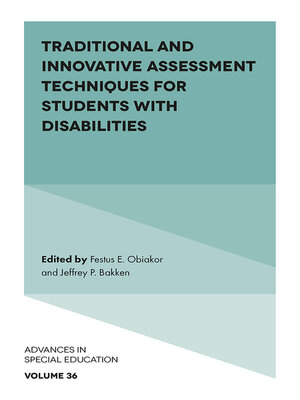Traditional and Innovative Assessment Techniques for Students with Disabilities, Volume 36
ebook ∣ Advances in Special Education
By Festus E. Obiakor

Sign up to save your library
With an OverDrive account, you can save your favorite libraries for at-a-glance information about availability. Find out more about OverDrive accounts.
Find this title in Libby, the library reading app by OverDrive.



Search for a digital library with this title
Title found at these libraries:
| Library Name | Distance |
|---|---|
| Loading... |
In order to properly understand and compare traditional and innovative assessment techniques for students with disabilities, we must be able to access examples of how they work in a logical and thoughtful sequence. This finely curated collection of thirteen chapters presents ideas and research on different disability topics from key leaders in the field of the assessment of children with disabilities.
Written by well-known and respected researchers, scholars, and educators who are actively involved in teaching undergraduate and graduate special education courses on the assessment of students with disabilities, this volume opens with a thorough introduction on the current situation. The topics covered by the remaining chapters include students with learning and intellectual disabilities, emotional and behavioral disorders, sensory impairments, extensive support needs, traumatic brain injuries, and those who are culturally and linguistically diverse, autistic, and those who have physical disabilities. The concluding chapter muses on what the future holds for traditional and innovative assessment techniques for students with disabilities. This volume is an excellent resource for special education researchers, scholars, practitioners, and professionals who teach and serve young learners with disabilities.
Written by well-known and respected researchers, scholars, and educators who are actively involved in teaching undergraduate and graduate special education courses on the assessment of students with disabilities, this volume opens with a thorough introduction on the current situation. The topics covered by the remaining chapters include students with learning and intellectual disabilities, emotional and behavioral disorders, sensory impairments, extensive support needs, traumatic brain injuries, and those who are culturally and linguistically diverse, autistic, and those who have physical disabilities. The concluding chapter muses on what the future holds for traditional and innovative assessment techniques for students with disabilities. This volume is an excellent resource for special education researchers, scholars, practitioners, and professionals who teach and serve young learners with disabilities.







